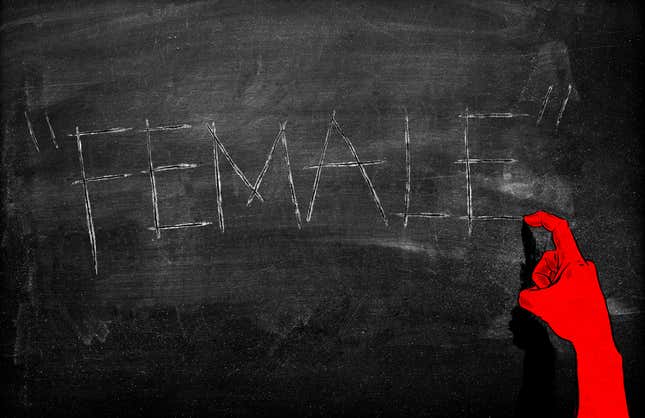The Problem With Calling Women 'Females'
Latest

For as long as I can remember, I’ve been immediately skeptical of men who use the word “female” to describe women. Before I was able to put my finger on what exactly bothered me about their use of the word, I simply relied on historical record: The men I liked and respected weren’t running around talking about females this, females that.
For many who use the word, I’m sure it seems innocuous. If you listen closely to the howling winds of patriarchy, you can make out their cries: Why are women making such a big deal about one word? Aren’t there more important issues, like rape? I don’t mean anything negative by it. It’s just a different way of saying “women.”
BuzzFeed’s Heben Nigatu and Tracy Clayton published “6 Reasons You Should Stop Referring To Women As ‘Females’ Right Now,” which cleverly touched on some of the firmest arguments against this particular use of the word.
No one is suggesting that calling women “females” is directly behind rape on college campuses and affordable access to birth control on Womanhood’s List of Very Important Priorities. It is a simple and relatively contained issue—and the staunch resistance to such a simple issue is extremely telling.
I can’t speak for all women and I’m sure there are plenty who don’t mind the usage or even employ it themselves, but the fact that you don’t often hear women running around referring to themselves and other women “females” is a solid clue that, at the very least, it’s not our first choice of noun. Much has been written about attempts by women to reclaim words like “bitch,” “cunt,” and “slut.” It’s interesting to consider that “female” isn’t really popping up among this shift in lexicon. It could be because women don’t see “female” as indicative of as strong an issue as these others—what’s being reclaimed about “bitch,” “cunt” and “slut” has just as much to do with their connotations of independence and sexuality as it does about the right to use these words in a non-disparaging way. Maybe “female” is less in need of saving. Or maybe, it’s indicative of a more slippery form of disrespect.
Clayton and Nigatu address what I believe to be the strongest argument against the word—that, from a logical and grammatical standpoint, calling women “females” is stupid. First:
1. Because the words “female” and “woman” mean different things.
“Female” is a scientific term that refers to the sex of a species that is capable of producing children. The term “woman” refers specifically to human beings, while “female” could refer to any species.
And:
5. Because it’s grammatically weird.
The word “female,” in its primary usage, is an adjective. When you use “female” as a noun, the subject that you’re referring to is erased.
Using “female” in this way is contrary to how we generally communicate. As noted above, “female” as a noun erases the subject—making “female” the subject of the sentence. In the most technical sense, it’s correct, but by employing this word that is usually an adjective as a noun, you’re reducing her whole personhood to the confines of that adjective. It’s calling someone “a white” instead of a white person, “a black” instead of a black person, and so on.
“When you refer to a woman as a female, you’re ignoring the fact that she is a female human,” write Nigatu and Clayton, pointing out the connotation that follows: “It reduces a woman to her reproductive parts and abilities.” The focus shifts away from the personal and onto onto her qualities as an object—qualities that have, historically, not been used in the best interest of women.
Personally, I always found the usage of the term “female” to be very clinical, and as cold as that word implies—as if you’re going out of your way to avoid saying “woman” or one of the many other synonyms for women that implies personhood.
Most of the terms we use for gender are both common—ladies and gentleman, boys and girl, men and women—and equally distributed in their usage. Male and female is the only pair where we see a notable difference. As Nigatu and Clayton note—we almost never refer to men as “males” in this way.
The meaning and consequences of the discrepancies in the languages we use to describe women versus men is well-documented: “slutty,” “bossy,” “aggressive,” for qualities that are valued and rewarded economically in men. As with all matters of word usage, context is key:
4. Because it is most often used to imply inferiority or contempt.
Not always, but often. And it’s typically when “female” is used as a noun (i.e., “Females are the worst!”). Here’s a fun exercise: Search the word “females” on Twitter and see what you get.
In my experience—and the experience of many, many other women—the vast majority of people who use “females” to refer to women are men who are expressing dislike, no matter how faint, of a group they consider a species. But because this connotation is socially constructed, rather than inherent to the meaning of the word, it often goes unnoticed.
Most people can understand why a woman wouldn’t want to be referred to as a bitch, whether or not they agree that the word is offensive. But to admit that the usage of “female” presents a problem requires that you trust women and their assessment of a particular interaction—that you are interested in how women feel about the context and delivery of this word.
So anyone who doesn’t trust a woman to understand how she’s being spoken to—or value her perception of such—would likely find no issue here. It can be hard for people to understand that there’s anything wrong with using “females” to refer to women other than the fact that women, generally, don’t like it. It can be even harder for people to understand that that reason should be enough.
Illustration by Jim Cooke.